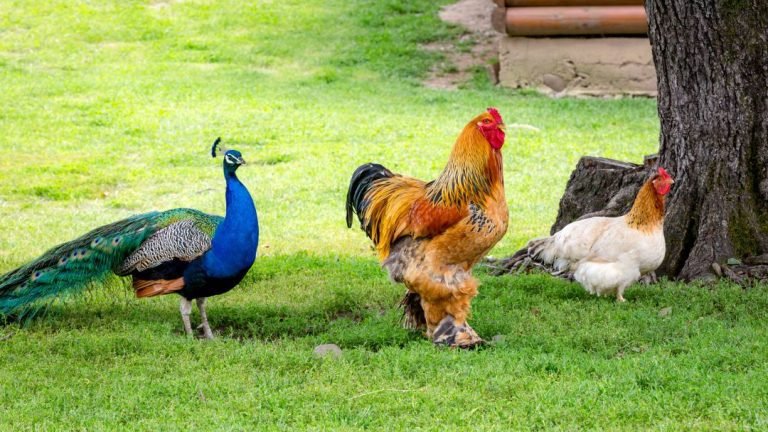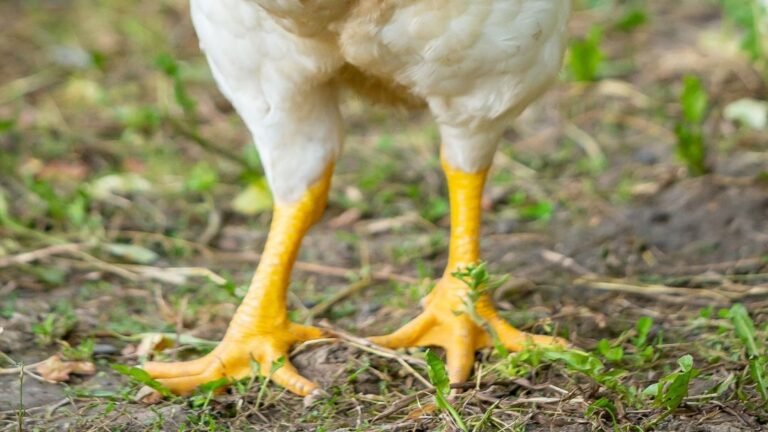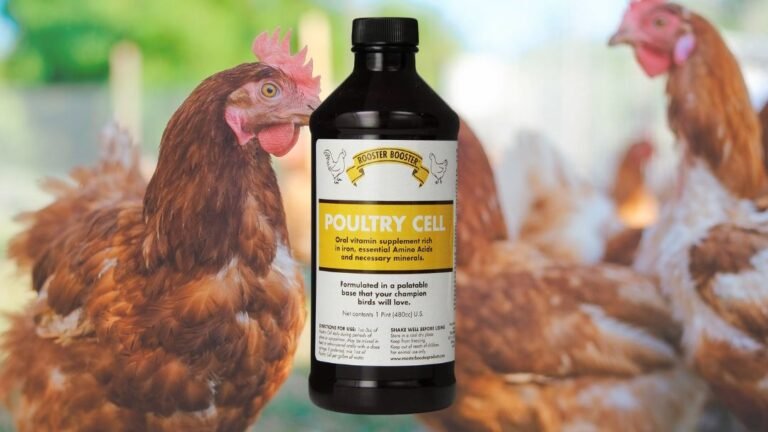Canker in chickens is a condition that affects the mouth and throat, causing sores and inflammation. In chickens with canker, there may be white or yellowish plaques or ulcers in the oral cavity, which can lead to difficulty eating and swallowing.
Canker in chickens is caused by a protozoan parasite called Trichomonas gallinae, and it is highly contagious. The parasite is commonly found in the mouths and throats of infected birds, and it can be transmitted through direct contact or contaminated water and feed.
If you suspect canker in your chickens, it is important to consult a veterinarian for diagnosis and treatment. Prompt treatment can help prevent the spread of the disease to other birds in the flock.
Understanding Canker: Identifying The Silent Threat
What Is Canker In Chickens?
When it comes to raising chickens, it is essential to be aware of the various diseases that can affect them. One such silent threat is canker. Canker, also known as avian trichomoniasis, is a common parasitic infection that affects the digestive system of chickens. It is caused by a microscopic organism called Trichomonas gallinae. This single-celled protozoan thrives in warm and damp environments, making chickens vulnerable to infection.Recognizing The Symptoms Of Canker
Identifying the symptoms of canker in chickens is crucial in preventing the spread of infection and seeking appropriate treatment. While some chickens may show no symptoms at all, others may exhibit specific signs to watch out for. These include:1. Loss of appetite: Chickens infected with canker often show a decreased interest in food. They may either eat significantly less or refuse to eat altogether. 2. Weight loss: Due to reduced food intake, infected chickens may experience sudden weight loss. 3. Yellowish plaques in the mouth and throat: Look for small, yellowish, cheese-like plaques in the back of the throat, mouth, or crop of the chicken. These plaques can cause difficulty in swallowing and breathing. 4. Excessive salivation: Canker can lead to an increase in drooling or salivation in infected chickens. 5. Lethargy and decreased activity: Chickens with canker may appear weak and lethargic, with a noticeable decrease in their usual activity level. 6. Changes in feces: Pay attention to any changes in the chicken’s feces. Infected birds may pass watery or blood-tinged droppings.Common Misconceptions About Canker
There are several misconceptions surrounding canker in chickens that can lead to delays in diagnosis and appropriate treatment. It is important to set the record straight on some of these misconceptions:1. Canker is not contagious to humans: While canker is an infectious disease, it is specific to birds and does not pose any risk to human health. However, it can spread easily from one bird to another, so taking preventive measures is crucial. 2. Only sick or weak chickens can get infected: Contrary to popular belief, canker can affect chickens of all ages and health conditions. Healthy birds can become carriers and unknowingly spread the infection. 3. Antibiotics are not the only treatment option: While antibiotics are commonly used to treat canker, there are alternative treatment methods available as well. Natural remedies and supportive care can be effective in managing canker in chickens.In conclusion, gaining a thorough understanding of canker, its symptoms, and dispelling common misconceptions is crucial in protecting the health and well-being of your chicken flock. By staying vigilant and taking proactive measures, you can ensure a healthy environment and minimize the risk of canker infections in your chickens.Causes And Transmission Of Canker
How Do Chickens Contract Canker?
Canker, also known as avian trichomoniasis, is a common infection in chickens caused by the protozoan parasite Trichomonas gallinae. Chickens primarily contract canker through the ingestion of contaminated food, water, or other substances. The parasite thrives in warm and moist environments, making it more prevalent during the summer months. While all chickens can be susceptible to canker, younger birds, especially those seven to twelve weeks old, are at a higher risk due to their weaker immune systems.
Identifying Common Sources Of Infection
To prevent the spread of canker within your flock, it is important to identify the common sources of infection. These sources can include contaminated feed or water, shared feeding and drinking areas, as well as contact with infected wild birds or carriers. It is worth noting that canker can also be transmitted through direct bird-to-bird contact, such as pecking or grooming activities.
Regularly inspecting your flock for any signs of infection and promptly isolating affected birds can help prevent the spread of canker. Here are some common symptoms to look out for:
- White or yellow cheesy patches in the mouth, throat, or crop area
- Difficulty swallowing or excessive saliva production
- Weight loss and lethargy
- In severe cases, labored breathing and swelling around the neck region
If you notice these symptoms in any of your chickens, it is crucial to take immediate action to prevent further transmission of the parasite.
Preventing The Spread Of Canker Within Your Flock
Preventing the spread of canker within your flock not only helps protect the affected birds but also ensures the overall health and well-being of your entire flock. Here are some measures you can take:
- Isolation: Isolate any birds exhibiting canker symptoms as soon as possible and keep them away from the unaffected members of your flock. This will help prevent the parasite from spreading.
- Sanitation: Clean and disinfect all feeders, drinkers, and coop areas regularly to reduce the risk of contamination. Consider using veterinary-recommended disinfectants to ensure effective cleanliness.
- Quarantine: Quarantine any new birds before introducing them to your existing flock. This will allow you to observe them for any signs of canker or other diseases before mingling with the rest of the flock.
- Proper nutrition: Maintaining proper nutrition and hygiene practices can boost the immune system of your chickens, making them less susceptible to canker and other infections. Ensure a well-balanced diet and access to clean water are provided at all times.
By following these preventive measures, you can significantly reduce the risk of canker transmission within your flock and maintain a healthy environment for your chickens.
Diagnosis And Treatment Of Canker In Chickens
Canker, also known as avian trichomoniasis, is a common parasitic infection that affects chickens worldwide. It is caused by a microscopic organism called Trichomonas gallinae, which primarily affects the upper digestive tract of the bird. Early diagnosis and prompt treatment are crucial in managing canker in chickens and preventing its spread within a flock.
Seeking Veterinary Assistance For Proper Diagnosis
Suspecting canker in your chickens can be distressing, but it is important to seek professional veterinary assistance to ensure an accurate diagnosis. A veterinarian with experience in avian health will be able to conduct the necessary tests to confirm the presence of Trichomonas gallinae and rule out other potential causes of similar symptoms.
Veterinary diagnostic methods for canker in chickens typically include:
- Microscopic examination of tissue samples or swabs from lesions or affected areas.
- Culture of the organism to grow it in a laboratory for identification.
- PCR testing to detect the genetic material of the parasite.
By consulting a veterinarian, you can be confident in the diagnosis of canker in your chickens and proceed with appropriate treatment.
Effective Treatment Options For Canker
Once canker has been diagnosed in your chickens, your veterinarian will recommend suitable treatment options. Effective treatment usually involves targeting the parasite directly and improving the bird’s overall health and immune system.
Treatment options for canker in chickens include:
- Antiparasitic medications, such as metronidazole, which are commonly administered orally or through the water supply.
- In some cases, surgical removal of large or persistent lesions may be necessary.
- Supportive care, including ensuring proper nutrition and hydration for the affected birds.
It is crucial to follow the veterinarian’s instructions carefully when administering medication and to complete the full course of treatment. Regular monitoring and re-evaluation may be necessary to ensure the infection has been fully resolved.
Preventive Measures And Management Strategies
Preventing canker in chickens is key to maintaining a healthy flock. Implementing proper management strategies and preventive measures can significantly reduce the risk of infection.
Consider following these preventive measures:
- Maintain clean and hygienic conditions in the coop and surrounding areas.
- Regularly clean and disinfect feeders, waterers, and equipment.
- Implement biosecurity measures to limit the introduction of the parasite to your flock.
- Monitor and control access to wild birds or other carriers of Trichomonas gallinae.
- Optimize nutrition to support a strong immune system in your chickens.
Remember, prevention is always the best approach. By implementing these strategies, you can minimize the risk of canker in your flock and ensure the well-being of your chickens.
Impact Of Canker On Chicken Health And Productivity
The Consequences Of Untreated Canker In Chickens
When it comes to the health and productivity of your chicken flock, it is essential to understand the impact that canker can have if left untreated. Canker, also known as avian trichomoniasis, is a highly contagious and potentially debilitating condition that affects chickens worldwide. It is caused by the protozoan parasite Trichomonas gallinae and primarily affects the digestive tract of chickens.
If canker is not identified and treated in a timely manner, it can have severe consequences for your chickens’ health. The parasite can cause inflammation, erosion, and ulceration of the crop, esophagus, and other parts of the digestive system, which can lead to difficulty in swallowing and eating. This can result in malnutrition, weight loss, and decreased overall productivity in egg-laying hens. In severe cases, chickens may become debilitated and have difficulty breathing, leading to reduced mobility or even death.
Understanding Economic Losses Associated With Canker
The economic impact of canker on poultry farms can be significant. Untreated canker can result in reduced egg production, decreased growth rates, and increased mortality rates in affected chickens. This can lead to lower profits for farm owners and increased costs for feed and medication to manage the condition. Additionally, the time and effort required to isolate and treat infected birds can further impact productivity on the farm.
It is important to address canker promptly to mitigate these economic losses. Early detection, proper treatment, and biosecurity measures can help minimize the spread of the parasite and its negative effects on the flock.
Long-term Effects On Flock Health And Productivity
The long-term effects of canker on flock health and productivity can extend beyond the immediate physical symptoms. Chronic or recurrent canker outbreaks can weaken the overall immune response of the flock, making them more susceptible to other diseases and infections. This can further compromise the health and productivity of the flock, leading to a cascade of additional problems.
Moreover, the stress caused by ongoing canker outbreaks can impact the birds’ well-being and behavior, resulting in reduced activity levels and social interactions. This can have a negative impact on the flock’s overall welfare, compromising their quality of life. By recognizing the long-term implications of canker, poultry farmers can prioritize preventive measures and early treatment to ensure a healthier and more productive flock.
Canker Prevention: Best Practices For Chicken Owners
htmlCanker is a common and highly contagious disease that affects chickens. It is caused by a protozoan parasite known as Tetrameres.
Implementing Biosecurity Measures To Prevent Canker
Biosecurity measures are crucial in preventing canker in chickens. By following these best practices, you can minimize the risk of canker spreading within your flock:
- Regularly disinfecting and cleaning coops, equipment, and feeding areas using recommended disinfectants.
- Isolating new chickens from the existing flock to prevent the introduction of diseases.
- Providing adequate spacing between coops to reduce the chances of disease transmission through direct contact or shared air space.
- Minimizing access to wild birds and rodents, as they can carry the canker-causing parasite. Securing the coop and using bird-proof feeders to prevent contact can help.
- Implementing strict hygiene practices such as washing hands, wearing disposable gloves, and changing footwear when moving between different flocks.
Vaccination Protocols For Canker Prevention
Vaccination is an effective method to prevent canker in chickens. Here are some vaccination protocols that can be followed:
- Consultation with a veterinarian to determine the appropriate vaccination schedule.
- Administering live or inactivated vaccines according to the recommended dosage and timing. This may include oral or injectable forms of vaccines.
- Maintaining accurate vaccination records to track the immunization status of individual chickens.
- Regular revaccination to ensure continuous protection against canker.
Promoting Overall Flock Health To Reduce The Risk Of Canker
Promoting the overall health of your flock is crucial in reducing the risk of canker. Here are some practices to consider:
- Providing a balanced diet that meets the nutritional requirements of chickens, including essential vitamins and minerals.
- Regularly monitoring chicken behavior and promptly identifying any signs of illness or distress. Early intervention can prevent the spread of diseases like canker.
- Implementing a deworming schedule to control internal parasites that can weaken the immune system and increase the susceptibility to canker.
- Promoting good ventilation in coops to reduce moisture and prevent the growth of canker-causing parasites.
- Quarantining sick poultry to prevent the spread of canker to healthy birds while providing appropriate treatment for the affected chickens.
By implementing these canker prevention measures and maintaining a proactive attitude towards the health of your flock, you can minimize the risk of canker in your chickens.
Conclusion
In sum, canker in chickens is a common ailment that can affect the overall health and productivity of these birds. By being proactive and implementing effective preventive measures such as proper hygiene practices, regular health checks, and appropriate treatment options, canker can be managed successfully.
It is essential to stay informed and seek professional veterinary advice to ensure the well-being and optimal performance of your chickens. Remember, a healthy flock equals a happy and thriving poultry business.




